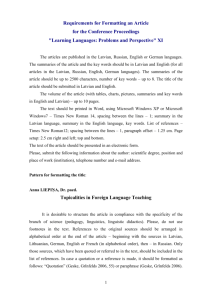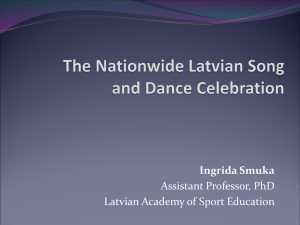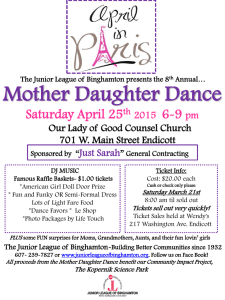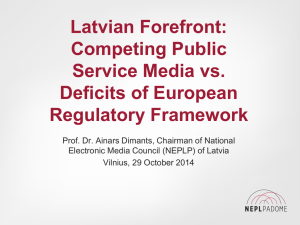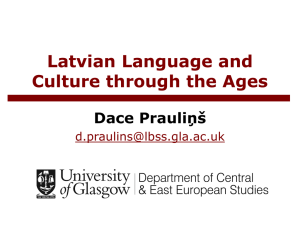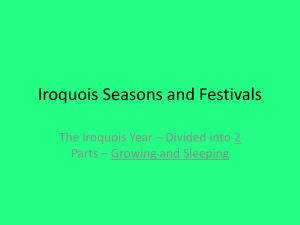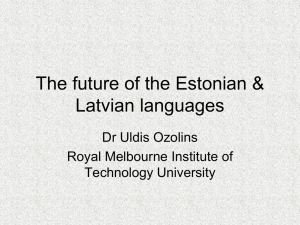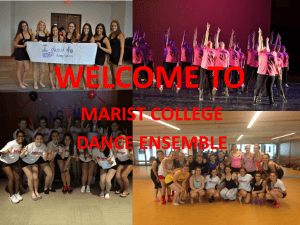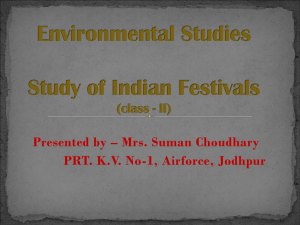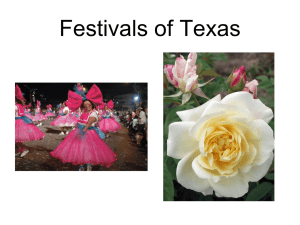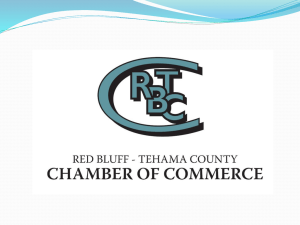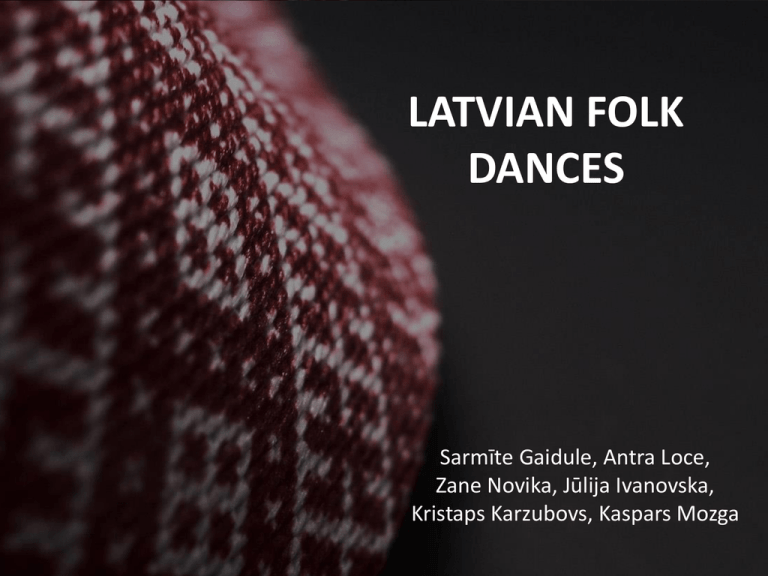
LATVIAN FOLK
DANCES
Sarmīte Gaidule, Antra Loce,
Zane Novika, Jūlija Ivanovska,
Kristaps Karzubovs, Kaspars Mozga
Latvian folk dance history
Latvian folk dance history starts at one time
with the Nationwide Latvian Song and Dance
Celebration, what is a traditional cultural
event in Latvia. Since the 1873 this festival has
taken place 25 times.
Celebration History
Festival have a 140 year-old history. It is a most
characteristic cultural tradition of the Baltic.
Festival is a unique Latvian folklore heritage.
2008 the tradition of the Latvian Song and
Dance Celebration was included in the
UNESCO.
The first Latvian National Song and Dance
Festival was the 1873 in Riga.
Festival organizer: Latvian Society of Riga
The Latvian Song Festival flag
X-XIX Song Festival took place during the Soviet
time.
Dance groups the first time participated in the
festival in 1948.
Since the 1960, every 5 years take place the
Latvian School Youth Song and Dance Festival.
The Latvian Song and Dance Festival
•
The Latvian Song and Dance Festival is
one of the largest amateur choral
events in the world and an important
event in Latvian culture and social life.
The All-Latvian Song and Dance Festival
has been held since 1873, normally
every five years. During the festivals
exhibitions of photography, art and folk
craft, orchestra concerts, and a festive
parade also take place. Approximately
30,000 performers altogether
participate in the event. Although
usually folksongs and classical choir
songs are sung, with emphasis on a
cappella singing, recently modern
popular songs have been incorporated
into the repertoire.
The Latvian Song and Dance Festival
•
The tradition of song festivals
originated in the first half of the
19th century in many European
countries and later was also
organized by the Baltic Germans.
1003 singers and 30 orchestra
players participated in the first
festival. Only once festival was held
outside Riga- in Jelgava in 1895.
Since 1960 a distinct Latvian Youth
Song and Dance Festival is held in
an alternate five year cycle, on a
matching scale. The last event took
place in July 2010. It will be
followed by the 2015 one.
Procession of the Nationwide Latvian
Song and Dance Festival participants
Dances are divided into:
Mixed dance ‘’Kazaks’’(Cossacks)
• Participants line up in 2 rows with the same
number of pairs in each.
• The first row moves forward to the second
and then steps back.
• Then the opposite row repeats the same
motion. Afterwards, both rows simultaneously
approach, pass through each other - dancers
turn around and return to their initial place.
• In the second run males from the first and
females from the second row move forward,
spin with a partner of the opposite sex using
the enclosed hand grip.
• Then return to their place and turn round by
elbows with their partner. The same repeat
females from the first and males from the
second row, etc.
The most fun and active dance, which
we know is ‘’Ābrama polka’’
https://www.youtube.com/watch?v=14YlFCuQ4fI
The most romantic and favorite dance
is ‘’Es noaudu zvaigžņu segu’’
https://www.youtube.com/watch?v=5fvfzXHEucU
Modern Latvian folk dance ‘’Līdz
pašām debesīm’’
https://www.youtube.com/watch?v=NEpwY1sXbsc
Folk Dress
Folk dress in Latvia has played and still
plays an important symbolic role in the
preservation of national values and cultural
heritage and in the creation of a feeling of
unity of the people. This occurred in the
1920s and 1930s, when the independent
Latvian nation was founded for the first
time and interest in folk dress was born;
during the years of Soviet occupation; and
after the renewal of Latvian independence
in 1991. Today folk dress has a different
application than in earlier centuries and
now it is worn only on festive occasions or
during performances. Nevertheless the
great amount of interest that Latvians
express in folk dress has helped to
preserve, research and popularise it.
There are five regions in Latvia with their
own specific traditions in dialect, housing,
and dress.
Our dance group in Rezekne. Dancing
– “Es noaudu zvaigžņu segu”.
THANK YOU
FOR ATTENTION!
LATVIAN FOLK
DANCES
Sarmīte Gaidule, Antra Loce,
Zane Novika, Jūlija Ivanovska,
Kristaps Karzubovs, Kaspars Mozga

